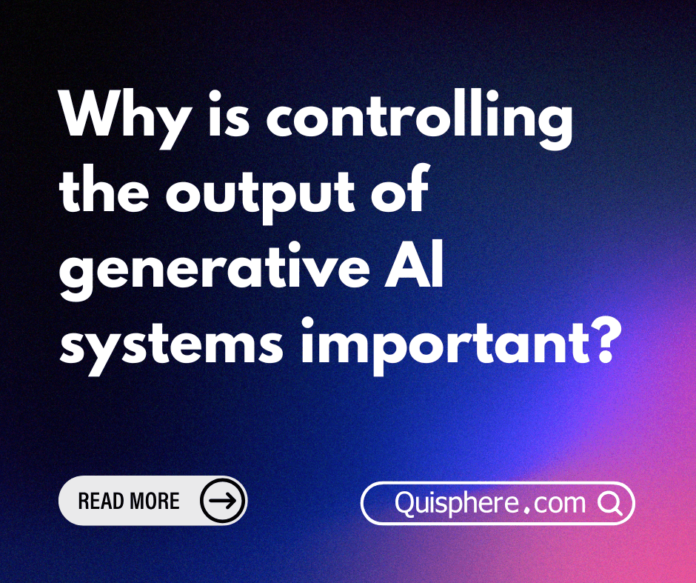Quiz Sphere Homework Help: Questions and Answers: Why is controlling the output of generative Al systems important?
Introduction
Generative AI systems are at the front lines of new technology. They are changing many fields by creating material like text, images, video, and music. A lot of data and complicated algorithms are used by these AI systems to make content that can be used in a lot of different scenarios. Generative AI has a lot of potential, but it also has a lot of problems, especially when it comes to managing what it makes.
Controlling the output of generative ai systems is very important to make sure that the content that AI makes is correct, moral, safe, and helpful. This blog post will talk about why this is the case. After reading this post, you’ll fully understand why it’s so important to handle AI output if you want to keep trust and speed in apps that use AI.
Why is Controlling the Output of Generative AI Systems Important?
Answer: Controlling the output of generative AI systems is important for ensuring that the information they produce is accurate, responsible, and relevant. AI can give people false or harmful information, show biases, or not meet their needs if they don’t have proper control over it. It also makes material more relevant to each person, which boosts creativity while keeping quality high. Keeping an eye on AI output also makes sure it follows the law and industry norms, which stops bad things from happening. In general, good output control makes the most of AI’s benefits while reducing its risks.
Understanding the Importance in Detail
To fully understand why it’s so important to control the output, let’s look at the main points:
- Accuracy and Reliability
- Ethical Considerations
- Personalization and Relevance
- Creativity and Innovation
- How to Avoid Unwanted Results
- Safety and following the rules
Every one of these things is necessary to make sure that generative AI systems not only work well, but also follow the rules of society, the law, and business.
1. Accuracy and Reliability
Generative artificial intelligence systems operate by studying patterns from vast amounts of data. Though they can produce excellent outcomes, they are not flawless. AI systems can always provide you erroneous or unreliable information. In fields that require accuracy and honesty in their facts, such as healthcare, education, or scientific research, this might be a major issue.
For example, an AI could generate false information with very negative consequences if it provided medical advice or scientific facts without appropriate supervision. Poorly written or erroneous material can damage a person’s reputation, harm a business, or even land them legal problems.
Why is this important?
- Factual Integrity: Making sure that the data used to make the material is correct and has been checked.
- Dependability: People must trust AI systems to give reliable, consistent results, especially in important fields.
- Reliability: People who use and buy AI-generated material depend on it being reliable. This trust falls apart when you can’t control the result.
Controlling the output makes sure that the AI is producing correct, dependable material that is in line with known facts. This lowers the risk of spreading false information.
2. Ethical Considerations
A lot of people in the tech world are worried about AI’s morals. This kind of AI could make biased, unfair, or even damaging content if nothing is done to stop it. It’s possible for AI systems to pick up on biases in the training data even when they don’t mean to. This could lead to outcomes that back up racist, sexist, or other harmful ideas.
AI could make text or images that support harmful stereotypes, or an algorithm could choose which groups of people to suggest over others. When AI is used in sensitive areas like healthcare, jobs, and rules, these kinds of effects can be very bad.
Why is this important?
- Getting rid of bias: Making sure that AI doesn’t make bad biases in society even stronger.
- Avoiding Harm: Making sure that AI doesn’t make something rude or harmful that could hurt people or groups.
- Promoting Fairness: AI must make material that treats everyone the same and doesn’t favor one group over another.
Developers can make sure that the AI doesn’t show bias and only makes content that is fair, includes everyone, and treats everyone with respect by controlling what it makes.
3. Personalization and Relevance
Generative AI application has one major advantage: it may modify content for everyone. But for personalization to be effective, the output of the artificial intelligence must be closely watched to ensure it meets the desires and requirements of various groups. Whether it’s tailored marketing emails, product recommendations, or customer service responses, the output must be relevant to the individual or group being targeted.
Artificial intelligence content could miss the mark if you lack sufficient control over it, which could cause frustration or disinterest in others. For instance, a customer service chatbot that answers depending on broad data might not be able to effectively address issues for consumers. Similarly, a marketing campaign that lacks sufficient personalization might disappoint consumers and lead to lower sales.
Why is this important?
- Relevance: Ensuring that material fits particular objectives helps to enhance the user experience.
- Engagement: Unique content is more likely to resonate with people, therefore increasing their interest and happiness.
- Loyalty to the brand: Companies can get closer to their customers if they give them customized experiences that fit their wants and needs.
Those who control the production can create really useful and relevant material, therefore boosting user happiness and involvement.
4. Creativity and Innovation
Control is necessary to make sure that things are done correctly and morally, but it doesn’t have to kill innovation. Actually, being able to direct what the AI does can make people more creative and open to new ideas. By changing the AI’s parameters and settings, developers can get it to come up with new ideas or content that might not be clear at first.
For example, in creative fields like art, music, and writing, generative AI can be trained to produce unique creations that people would find difficult to imagine on their own. Without guidance, AI could produce dull or repetitive material. A well-directed artificial intelligence will continue to create fresh and fascinating work fulfilling the artistic objectives people have.
Why is this important?
- Originality: AI output that can be controlled helps people come up with new ideas and content.
- Quality: Fine-tuning the AI makes sure that the material it creates is up to high creative standards.
- Innovation: Content that pushes the limits of what’s possible is made by controlled AI, which encourages innovation.
We can use the AI’s creative potential while making sure that the material it creates is original and of high quality by controlling what it does.
5. How to avoid unwanted results
If generative AI systems are not properly managed, they may produce unexpected results. The consequences could include making content that isn’t useful or helpful or breaking the law by accident. For instance, an AI system used to moderate content could wrongly mark as inappropriate content that isn’t harmful, or a language generation model could come up with a response that is against the law.
To keep these unintended results from happening, developers need to set up controls that tell the AI what to do and make sure it stays within the limits that have already been set. In this way, they can avoid making mistakes that cost a lot of money and could hurt the company’s image or get them into trouble with the law.
Why is this important?
- Risk management: stopping unintended events that could hurt your image or get you in trouble with the law.
- Preventing Mistakes: Making sure the AI doesn’t make content that could hurt people or break the law.
- Consistency: Making material that you know will be there and that fits with your goals.
Businesses can handle risks and make sure that content made by AI meets the standards they want as long as they have the right controls in place.
6. Safety and following the rules
In many fields, following the rules is very important. There are strict rules about what content can be made and how it must be offered in every field, from finance to healthcare to education. If generative AI is not properly controlled, it could make material that breaks these rules, which could lead to fines or lawsuits.
In the financial industry, for instance, remarks or recommendations from AI have to follow the guidelines established by the Financial Industry Regulatory Authority (FINRA) or the Securities and Exchange Commission (SEC). Content produced by artificial intelligence in the healthcare sector has to comply with policies including HIPAA (Health Insurance Portability and Accountability Act), which safeguards patient data and maintains its confidentiality.
Why is this important?
- Legal Compliance: Making sure that material made by AI follows the rules set by law and government.
- Safety: keeping users and customers safe from material that is harmful or doesn’t follow the rules.
- Industries must follow the strict rules set by government agencies to make sure that AI applications are safe and trustworthy.
Businesses can make sure they follow industry rules and protect their operations and identities by controlling the output of generative AI.
Conclusion
In conclusion, controlling the output of generative AI systems is not only important for making sure they don’t make mistakes; it’s also necessary to make sure they work in an honest, responsible, and useful way. Managing the AI’s output is important for getting the most out of it while minimizing risks. This is true whether the goal is to ensure accuracy, stop bias, personalize content, boost innovation, or make sure compliance. To use the power of generative AI for good, it will become even more important to have strong output control systems as it develops.
By putting in place the right oversight and control measures, we can make sure that content made by AI stays helpful, moral, and in line with the wants of users and society as a whole.



